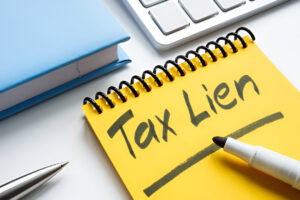Filing Bankruptcy in Texas While Facing a Tax Lien: What You Need to Know

Facing a tax lien in Texas can feel overwhelming, especially when you’re already dealing with financial challenges. You may wonder, “Can bankruptcy help me with my tax lien?” The answer is nuanced—while bankruptcy can provide relief for some IRS debts, tax liens involve specific rules and protections.
What is a Tax Lien and How Does it Affect You?
A tax lien is a legal claim the IRS or state places on your property due to unpaid taxes. It’s a tool creditors use to secure payment and can significantly impact your finances and property rights.
How Tax Liens Work
When you owe taxes, the IRS or state can issue a lien against your assets, including your home, car, or bank accounts. This lien restricts your ability to sell or refinance property, appears on your credit report, damaging your credit score, and can lead to seizure of assets if left unresolved.
For further details about tax liens, visit IRS Tax Lien Information.
How Bankruptcy Can Help with Tax Liens in Texas
Bankruptcy offers several tools to manage IRS debts and tax liens, but it’s important to understand what it can and cannot do.
1. Tax Debt Discharge
Bankruptcy can discharge some tax debts if they meet specific criteria: the taxes are income taxes (not payroll or fraud penalties), the debt is at least three years old, a tax return was filed at least two years before filing bankruptcy, and the IRS hasn’t assessed the debt in the last 240 days. If your tax debt qualifies, Chapter 7 or Chapter 13 bankruptcy can eliminate it.
2. Impact on Tax Liens
While bankruptcy can discharge personal liability for eligible tax debts, existing tax liens remain attached to your property. For example, if a lien was recorded before filing bankruptcy, it still affects your property, and you must negotiate or pay the lien to sell or refinance the asset.
Chapter 7 vs. Chapter 13: Which Is Better for Tax Liens?
Chapter 7 Bankruptcy
This form of bankruptcy can wipe out unsecured tax debts, but it doesn’t remove tax liens from your property. However, it provides relief by discharging qualifying tax debts and stopping wage garnishments or levies temporarily.
Chapter 13 Bankruptcy
Chapter 13 allows you to include tax debts and liens in a structured repayment plan. This lets you pay off the lien over three to five years and protects your property from seizure during the repayment period.
How to Protect Your Property During Bankruptcy
1. Homestead Exemption
Texas has strong homestead protections that shield your primary residence from creditors, including tax liens in certain cases.
2. Negotiating with the IRS
Consider working with an attorney to negotiate a settlement or lien release. Bankruptcy often strengthens your position in these discussions.
3. Timing Your Bankruptcy Filing
Strategic timing ensures that your bankruptcy addresses as much of your tax debt and lien-related issues as possible.
FAQs About Tax Liens and Bankruptcy in Texas
Can bankruptcy eliminate a tax lien? No, bankruptcy can discharge personal liability for the underlying debt, but recorded tax liens remain on your property unless paid or negotiated.
Will bankruptcy stop the IRS from seizing my property? Yes, filing for bankruptcy triggers an automatic stay, temporarily halting IRS collection actions, including property seizures.
What happens if I sell a property with a tax lien during bankruptcy? Proceeds from the sale must satisfy the lien unless negotiated otherwise.
Is all tax debt dischargeable in bankruptcy? Only qualifying income tax debts are dischargeable. Other types, like payroll taxes or fraud penalties, are not.
Do I need an attorney for tax liens and bankruptcy? Yes, navigating IRS rules and bankruptcy law requires expert guidance to ensure your rights and assets are protected.
Why Choose Kisch Consumer Law?
Navigating bankruptcy while managing a tax lien requires specialized expertise. At Kisch Consumer Law, we help Texans protect their property and find tailored solutions for tax and bankruptcy issues.
What We Offer
We bring Texas-specific expertise with deep knowledge of state exemptions and federal tax laws. Customized strategies provide tailored plans to address your unique financial situation. Transparent communication offers clear guidance through every step of the process. Proven results demonstrate a track record of helping clients reduce tax burdens and keep their property.
Quick Tips for Handling Tax Liens and Bankruptcy
Know your rights and understand what tax debts can be discharged and how liens affect your property. Act quickly to address IRS debts early to avoid escalations like seizures or levies. Work with experts to maximize bankruptcy protections while resolving tax liens.
Take the Next Step with Kisch Consumer Law
Dealing with a tax lien while considering bankruptcy can feel overwhelming, but you don’t have to face it alone. At Kisch Consumer Law, we’re here to provide expert guidance and a path forward. Contact us today to schedule a consultation and explore how bankruptcy can help you manage your tax lien and protect your future.
A Lighthearted Closing Thought
Think of bankruptcy as a financial GPS and tax liens as detours. Together, we’ll help you navigate the bumps, find the best route, and reach a stable destination. Let’s map out your financial future today!
